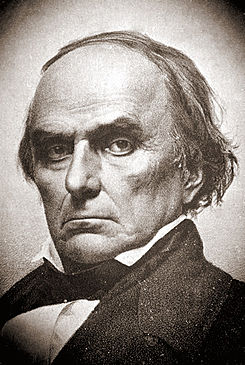
Back دانيال وبستر Arabic دانيال وبستر ARZ دنیل وبستر AZB Дэніэл Уэбстэр Byelorussian Daniel Webster Czech Daniel Webster German Ντάνιελ Γουέμπστερ Greek Daniel Webster English Daniel Webster Esperanto Daniel Webster Spanish
Daniel Webster | |
|---|---|
 Daguerreotype of Senator Webster circa 1847 | |
| 14th United States Secretary of State | |
| In office March 6, 1841 – May 8, 1843 | |
| President | William Henry Harrison John Tyler |
| Preceded by | John Forsyth |
| Succeeded by | Abel P. Upshur |
| 19th United States Secretary of State | |
| In office July 23, 1850 – October 24, 1852 | |
| President | Millard Fillmore |
| Preceded by | John M. Clayton |
| Succeeded by | Edward Everett |
| United States Senator from Massachusetts | |
| In office June 8, 1827 – February 22, 1841 | |
| Preceded by | Elijah H. Mills |
| Succeeded by | Rufus Choate |
| In office March 4, 1845 – July 22, 1850 | |
| Preceded by | Rufus Choate |
| Succeeded by | Robert C. Winthrop |
| Member of the U.S. House of Representatives from Massachusetts's 1st district | |
| In office March 4, 1823 – May 30, 1827 | |
| Preceded by | Benjamin Gorham |
| Succeeded by | Benjamin Gorham |
| Member of the U.S. House of Representatives from New Hampshire's At-large district | |
| In office March 4, 1813 – March 3, 1817 | |
| Preceded by | George Sullivan |
| Succeeded by | Arthur Livermore |
| Personal details | |
| Born | January 18, 1782 Salisbury, New Hampshire |
| Died | October 24, 1852 (aged 70) Marshfield, Massachusetts |
| Political party | Federalist National Republican Whig |
| Spouse(s) | Grace Fletcher Webster Caroline LeRoy Webster |
| Alma mater | Dartmouth College |
| Profession | Politician, Lawyer |
| Signature | |
Daniel Webster (January 18, 1782 – October 24, 1852) was an important American statesman. He first became famous because of his defense of New England shipping interests. In his life, he became more and more nationalistic, and convinced many people to become nationalists too. This made Webster one of the most famous orators and powerful Whig leaders of the Second Party System. Webster did not like slavery, but he thought it was more important for the Union (the United States) to stay together than anything else.
Webster became the northern member of a group known as the "Great Triumvirate". They included his colleagues Henry Clay from the west and John C. Calhoun from the south. His "Reply to Hayne" in 1830 was generally seen as "the most eloquent (powerful, fluent, well-spoken) speech ever delivered in Congress."[1] Webster tried to keep the nation from civil war, and make them have a firm peace. His efforts did not succeed, but he was still respected for them. He was officially named by the U.S. Senate in 1957 as one of its five best members.[2]
- ↑ Allan Nevins, Ordeal of the Union" (1947) 1:288
- ↑ "U.S. Senate: Art & History Home > People > Senators > The "Famous Five" Now the "Famous Nine"". senate.gov. Retrieved 28 May 2010.